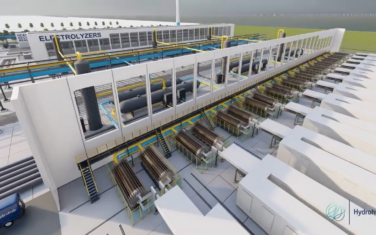Green hydrogen is a crucial element in the large scale sustainable energy system of the future. Huge amounts of hydrogen are needed to buffer the fluctuations in electricity production and create a robust energy system. It’s also crucial for industries and transport sectors that cannot be powered electrically.
Hydrogen can be used as energy storage, energy carrier, and feedstock. As an energy carrier, it enables the storage of renewable electricity produced by wind farms and solar plants. It also offers a sustainable alternative for grey hydrogen used by the chemical industry as a feedstock for the production of chemicals. Green hydrogen is one of the key puzzle pieces of the energy transition.
Green hydrogen is crucial for industries and transport that cannot be powered electrically
ISPT works on projects that develop new hydrogen production technologies, scale up existing technologies, and develop the supply chain.
Producing green hydrogen for the Dutch industry
Design of a 1GW green hydrogen plant
Recently, we published an advanced design of a 1 gigawatt green-hydrogen plant. It puts us one important step further towards a Dutch hydrogen economy.
Cooperation with partners
ISPT makes every effort to create a trust-based environment, connecting the parties involved and facilitating their sharing of expertise and know-how in joint projects.
We connect the Dutch manufacturing industry, the end users, academic partners to bring innovations rapidly from idea to market. In total, over 90 parties are connected to the Hydrohub Innovation Program.
Any questions or enquiries?
The Hydrohub Innovation Program is open for more participants. Please feel free to contact us if you have any questions.
Our green hydrogen projects
The Hydrohub Megawatt Test Center
Development of an open-innovation infrastructure for stress testing of water electrolysis technology at an industrially relevant scale.
The Hydrohub Gigawatt Scale Electrolyser
Conceptual design of a many-electrolyzer system of gigawatt size – the size that bridges large-scale renewable power production in offshore wind parks and industrial-scale use of hydrogen for feedstock and energy purposes.
The HyChain studies
A series of exploratory studies focused on a strategic understanding of the drivers behind global emergence of hydrogen value chains, covering aspects such as sources of supply, demand, transport, costs, environmental impact and public engagement.
Hydrohub HyScaling
Better performing electrolyzers by improving the manufacturing and the project aims to reduce 25-30% for levelized costs of hydrogen (compared to the state-of-the-art technology) by 2030.
Green Hydrogen Safety in Large-Scale Industrial Production
We want to deepen the understanding of the potential risks of explosions due to mixtures of hydrogen and oxygen in electrolysis equipment. The project provides credible scenarios and facts on the fundamentals of explosions and the validity of detonation.
Solide Oxide Electrolysis Development
A solid oxide electrolyzer cell (SOEC) is a solid oxide fuel cell that runs in regenerative mode to achieve the electrolysis of water (and/or carbon dioxide) by using a solid oxide, or ceramic, electrolyte to produce hydrogen (and/or carbon monoxide) and oxygen. The technology allows high-temperature electrolysis, typically between 500 and 850 degrees C.
H2-Safety2
This hydrogen safety project aims to develop recommendations for standardisation, meeting process safety requirements for large scale water electrolysis. This is an important step to enable a safe, integrated hydrogen-based energy transition.
DC-DC converters
In this project, our aim is to investigate the benefits, costs and constraints of connecting a High-Voltage Direct Current (HVDC)/ Multi-Voltage Direct Current (MVDC) infrastructure to a future (virtual) green GigaWatt hydrogen plant in The Netherlands.















